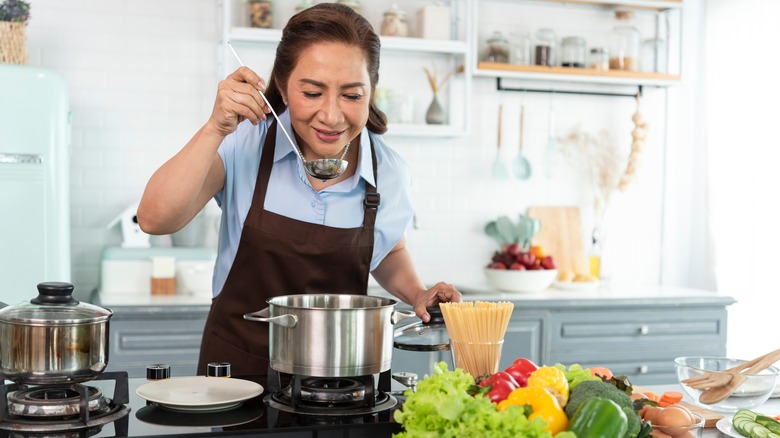Jeff Mauro's Simple Tip For Amateurs On Worst Cooks In America's Season 26 Premiere
Food Network's amateur competition show "Worst Cooks in America" is a buffet of hilarious cooking mistakes, from familiar foibles to downright dangerous ones. The show has featured what may very well be some of the most shockingly inept kitchen moments in cooking history, and provided some noteworthy (albeit often common sense) cooking tips along the way. Season 26, which kicked off on August 6, is already off to a strong start, with host and mentor Chef Jeff Mauro turning one contestant's mistake into a lesson for all beginner chefs.
The moment, which was posted by Food Network in a YouTube montage of the craziest of the season, features contestant Etherio Noon grimacing when Mauro offers him a taste of Dijon mustard. Mauro was quick to share his thoughts: "Taste something before you put it in something for the first time," Mauro instructs. "That's why we taste as we go." Sure, it's simple enough, but this trick could save you from over-seasoning your entire dinner. And hey, no one wants to eat cajun pasta that just tastes like a jar of mustard.
It's as easy as tasting as you go
Cooking catastrophes on "Worst Cooks in America" have included spills, fires, and even a woman reaching into boiling water with her bare hands to retrieve a potato. Most of the contestants lack basic kitchen instincts, and that definitely extends to the flavor department.
Season 26 contestant Etherio Noon certainly falls into this category, described in his official Food Network bio as a chronic over-seasoner. It appears this is the skill Jeff Mauro is trying to work on when he offers Noon a taste of his own medicine. "You realize, I probably shouldn't have put Dijon in my pasta," Mauro explains, referring to the risks of only tasting an ingredient after you've already added it to your food. Sure, you probably aren't spooning Dijon into everything you make, but Mauro's advice of tasting before adding and continuing to taste as you go is a tried and true technique — and a big step you still might be skipping when you're making soups.
The "before" and "as you go" parts are crucial here, because adding a lot of something before you taste it can make it impossible to fix the flavor profile of something like a sauce. While you can always adjust later to make a dish less bland, you can't easily correct it in the other direction.

